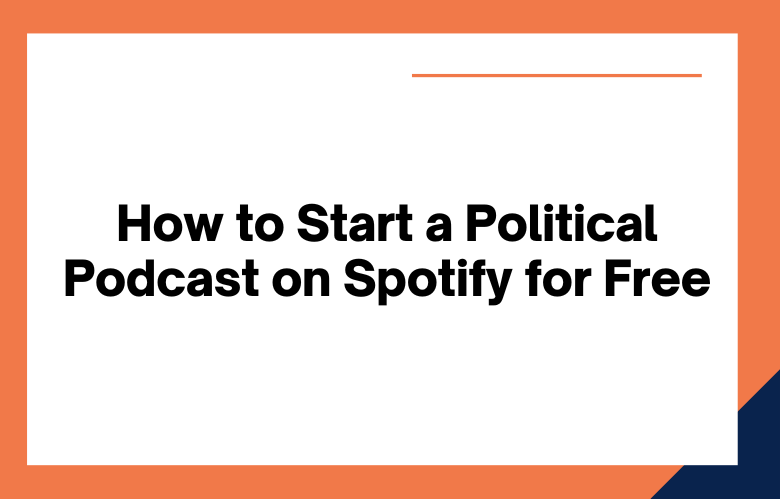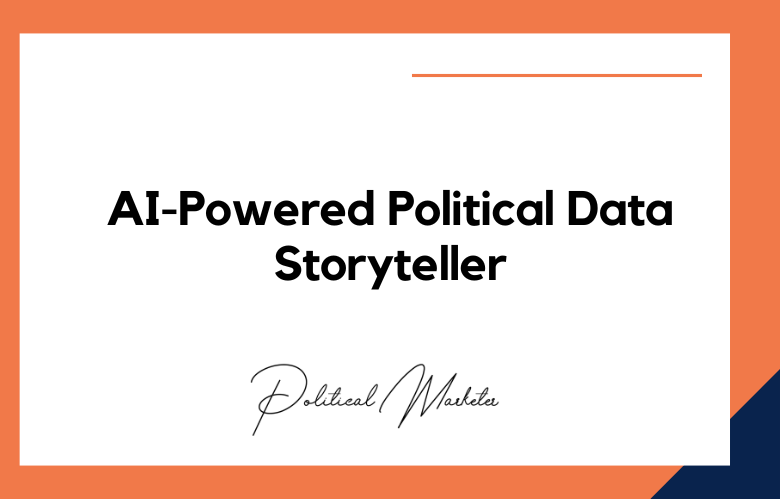If you’re passionate about politics and want to share your thoughts with the world, starting a political podcast is a great way to do it. And best of all, you can do it for free using Spotify. In this guide, we’ll walk you through the steps involved in setting up your political podcast on Spotify.
Looking to start your political podcast but don’t know where to start? Look no further! In the blog post, we’ll show you how to create a political podcast on Spotify for free in just a few simple steps.
If you’re interested in politics, there’s a good chance that you’ve considered starting your political podcast. It is a big way to share your thoughts on the day’s news with like-minded people, and it doesn’t have expensive or time-consuming. You can start a political podcast on Spotify for free. Here’s how:
First, create a profile for your podcast on Spreaker, an online platform for creating and hosting podcasts. Speaker makes it easy to create a professional-looking podcast page with all the essential information (e.g., title, description, website URL, etc.).
Once your Spreaker profile is updated, create a new show and add episodes. Each episode should include:
- A brief intro about the episode
- The news stories or topics are discussed
- Your thoughts and analysis on each story
Once your episodes are uploaded, promote them on social media and online. Ask people to subscribe to your podcast so they can automatically receive new episodes when they’re released. And most importantly, have fun! Podcasting is a big way to share your thoughts and opinions.
What is a political podcast, and why should you start one?
A political podcast is a great way to stay current on current events and learn about different viewpoints. Plus, creating your podcast is a fun and creative way to share your thoughts and opinions with the world!
A political podcast is a type of audio program that focuses on discussing current events and politics.
There are many reasons to start a political podcast. Perhaps you’re passionate about current affairs and want to share your views with others. Maybe you’re looking for a way to engage with the political process more meaningfully. Or perhaps you think it would be fun!
Whatever your reasons, starting a political podcast is a great way to connect with others, share your ideas, and make your voice heard.
Do you have strong opinions on politics? Do you like to talk about the latest news and developments? If so, then starting a political podcast could be a great way to share your thoughts with others.
A political podcast is a great way to engage with like-minded people and discuss the topics that matter to you. You can use your platform to share your opinions, analysis, and predictions with the world.
Decide what type of political podcast you want to create. There are different styles and formats. Do you want to interview guests? Have debates? Update listeners on the latest news. Once you know what type of podcast you want to create, the rest will be easier to plan.
Determine your target audience. Who do you want to reach with your podcast? What type of people will be interested in listening? It helps you determine the topics you discuss and the tone of your show.
Start planning and recording your episodes! once you have everything planned out, it’s time to start sharing your thoughts with the world.
How to start a political podcast on Spotify for free
Are you passionate about politics? Do you have something to say? Then starting a political podcast on Spotify might be the perfect outlet for you! And the best part is, it’s free!
Here’s what you’ll need:
- A computer with internet access
- A microphone
- Recording software (Audacity is a good option)
- Spotify account
Now let’s get started!
Have you ever wanted to start a political podcast on Spotify but didn’t know how? Creating your podcast is relatively easy, and best of all, it’s free! Here’s how:
First, create a new account on Anchor. FM. Once you’re signed in, click “Create a new show.” Give your show a name, then hit “Continue.”
Next, you’ll need to connect your Spotify account. Click “Connect” next to Spotify, then log in with your Spotify credentials. Once you log in, Anchor will automatically pull in any existing Spotify playlists that you have.
Now comes the fun part: recording your first episode! Click the “Record” button on Anchor’s interface, then start talking. When you finish recording, hit “Stop Recording.” You can then preview your recording and make any necessary edits.
Once you’re happy with your recording, it’s time to publish it. Hit the “Publish” button, and your episode automatically uploads to Spotify (you can also choose to publish it on other platforms like Apple Podcasts and Google Play). That’s it – you’re now a podcast host!
What equipment do you need to get started podcasting?
What do you need to get started podcasting? You might be wondering about the answer to this question. Well, I wonder no longer! Here is a list of the equipment you need to get started podcasting:
- A computer
- A microphone
- Recording software
- An audio editor
With just this essential equipment, you can start podcasting!
Podcasting shares your thoughts and ideas, but before you start, there are a few things you’ll need.
First, you’ll need a microphone. A good quality microphone makes a big difference in the sound quality of your podcast.
You’ll also need some recording software. There are many options available, so research to find one that fits your needs.
Finally, you’ll need a place to host your podcast. Once again, there are many different options available. Take some time to research your options and find the one that’s right for you. Once you have all of these things, you’re ready to start podcasting!
Tips for creating engaging and informative political podcasts
- Research your topic thoroughly to ensure your information is accurate
- Keep your episodes short and sweet- people have short attention spans these days
- Make sure to include lots of visuals (graphics, audio clips, etc.) to keep listeners engaged
- Be sure to have a clear and concise introduction and conclusion for each episode
- Ask listeners for feedback and take it into account when creating future episodes
- Do your research- make sure you know what you’re talking about
- Keep your episodes short
- Use sound effects and music to keep listeners engaged
- Have guests on your show to add variety and new perspectives
- Listen to feedback from listeners and use it to improve future episodes
- Start by deciding on a format for your podcast
- Choose a topic that you’re interested in and knowledgeable about
- Research your topic so you can provide accurate information to listeners
- Find guests who can share their expertise on the topic
- Record your episodes in a quiet place with good sound quality
- Edit your episodes before publishing them
- Promote your podcast on social media and other platforms
- Listen to feedback from listeners and use it to improve future episodes
- Research your topic in depth so that you can provide accurate information to your listeners
- Make sure your podcast is well-organized and easy to follow
- Engage with your listeners by taking questions and comments on social media and through email
- Promote your podcast on other podcasts, websites, and social media platforms
- Record high-quality audio using a good microphone
- Edit your episodes carefully for mistakes and clarity
- Find a niche topic to focus on
- Research your topic in depth
- Interview experts and other podcasters on your topic
- Create exciting and engaging soundbites
- Edit your podcast for length and clarity
- Add music and sound effects to make it more interesting
- Keep your episodes short and to the point- no one wants to listen to an extended podcast
- Use interesting guests and soundbites to keep listeners engaged
- Make sure your podcast is adequately edited and has a consistent sound quality
- Find a topic that you’re interested in and know a lot about
- Research your topic thoroughly so that your podcast is well-informed
- Create a logo and artwork for your podcast
- Record your episodes using a good microphone and editing software
- Make sure to promote your podcast on social media and other platforms
- Engage with listeners by taking questions and comments on social media or through email
- Keep producing new episodes to keep people coming back
- Research your topic exhaustively so you can provide accurate information
- Keep your episodes short and to the point- people have shorter attention spans these days
- Use humor and personal stories to keep listeners engaged
- Engage with listeners by taking questions and comments on social media or in person
- Be prepared for negative feedback, but don’t let it discourage you
- Research your topic inside and out
- Find a unique angle to approach the topic from
- Interview exciting guests who can offer valuable insights
- Use sound effects and music sparingly to avoid overwhelming the listener
- Listen to feedback from listeners and use it to improve your show
- Make sure all of your research is factual and accurate
- Be prepared to answer tough questions from listeners
- Listen to feedback and make changes accordingly
How to market your new political podcast
- Get the word out there about your new political podcast! Use social media, post about it on forums, and tell all your friends.
- Try to get some interviews with high-profile guests lined up. It helps give your podcast a boost and attract more listeners.
- Partner with like-minded websites and podcasts to help promote each other. You can reach many audiences and get more people interested in what you have to say.
To market your new political podcast, start by identifying your target audience. Then, develop a marketing plan that includes both online and offline activities. For example, create a website for your podcast and register it with directories like iTunes. Promote your podcast on social media sites and forums related to politics. In addition, consider doing media interviews and guest blogging to reach even more potential listeners.
Find a few tips to help you market your new political podcast effectively.
First, consider your target audience. Are you looking to appeal to registered voters? Or perhaps you’re targeting politically active young adults who are not yet registered to vote. Once you know who you want to reach, tailoring your marketing efforts will be much easier.
Next, think about how you can stand out from the crowd. There are thousands of podcasts out there, so what makes yours unique? Knowing your USP (unique selling proposition) will be vital in developing an effective marketing strategy.
Finally, focus on creating quality content that will encourage people to tune in and share with their friends. Well-produced episodes that offer thoughtful analysis and witty banter will help attract listeners and keep them coming back for more.
Sample topics for a political podcast
- A discussion on the current state of democracy
- A conversation about the history of political parties in the United States
- An exploration of the different philosophies that guide various political ideologies
- A debate on the pros and cons of capitalism
- An examination of the role of media in politics
- An analysis of how special interests groups influence government policy
- The current state of affairs in the political landscape
- The effect of social media on politics
- The rise of populist movements around the world
- The importance of voting and political participation
- The implications of nationalism and protectionism
- The impact of global warming on the political arena
- The debate over immigration and its solutions
- Are- Wondering what to talk about on your political podcast?
- Here are some sample topics to get you started:
- The pros and cons of socialism
- The history of the Cold War
- How immigration policy has changed over time
- Famous political speeches through the ages
- The role of the media in politics
- Corruption in government
- Interest groups and their influence
- Alternative voting systems and why they could work better
Conclusion
If you want to start a political podcast, we recommend using Spotify. It’s free and easy to use. Plus, it has a large user base that can help you reach new listeners. We offer Political Podcast Consulting if you need help getting started or want someone to manage your show for you.
Contact us today to learn more!











